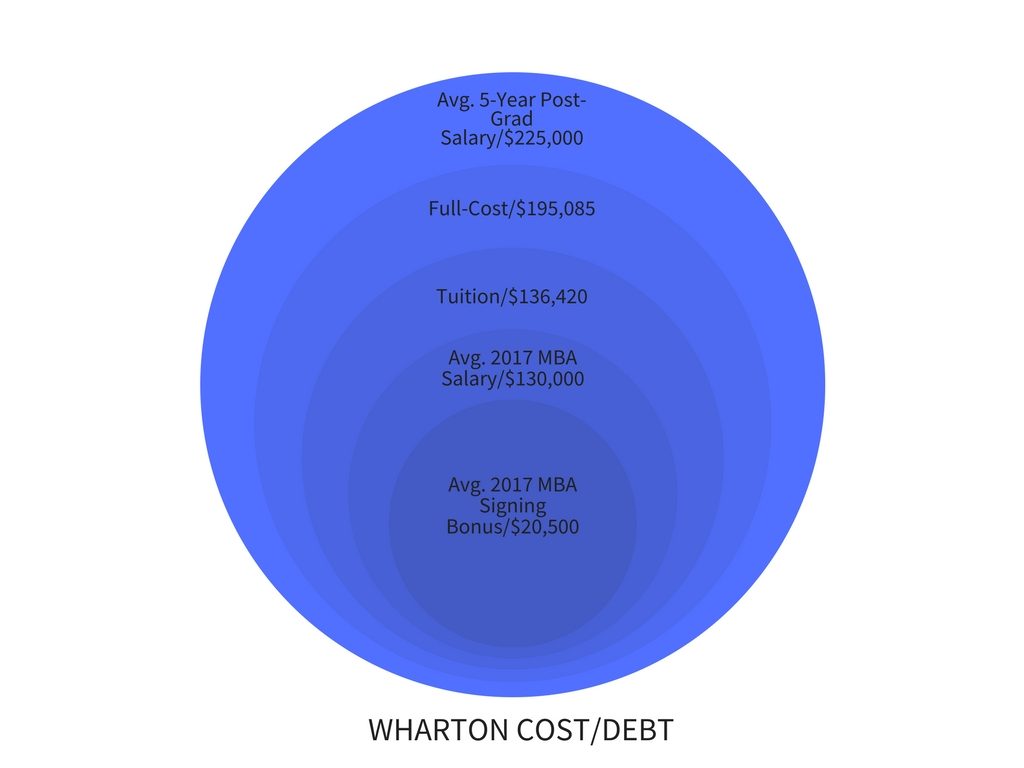The Future of Employment at Philly Business Schools

When considering where to get your MBA, one of the first questions you should ask is, “What will my employment outlook be?” After all, the reason you get an MBA is to improve your career. But what is important when it comes to employment trends at the leading business schools in Philadelphia? There are quite a few different statistics you should look at.
Important MBA Employment Statistics
To choose an MBA program based on your future career success, there are a few questions you need to answer.
- What industry do I want to work in and does the school place a majority of their students in that industry?
- What percentage of students receive and accept job offers? The same for internships?
- Self-employed or entrepreneurship data?
- What salary can I expect?
- Where do most students end up living and work?
- Who are the top employers?
You also want to look at any trends between years. For example, the percentage of students receiving job offers should increase year-over-year. And if you see a shift from the consulting industry to financial services, you want to be aware that the school could be changing its direction.
So, what does employment look like for three of the top Philly business schools?
The Wharton School
At the Wharton School at the University of Pennsylvania, the employment trends year-over-year are fairly consistent. While the percentage of students reporting job offers dropped from 2016 to 2017, part of that reason may be the increased number of students seeking employment (75.2 percent vs. 79.1 percent).
As for the increase in median salary, that can be attributed to inflation as well as an increase in job salary for each industry including professional services rising from $160,000 in 2016 to $180,000 in 2017. The location of jobs also changed slightly between 2016 and 2017, but that could be due to various reasons including the current state of international affairs for the U.S.
| The Wharton School | 2017 | 2016 |
|---|---|---|
| Percentage of students reporting job offers | 97.1 percent | 98.3 percent |
| Percentage of self-employed students or those starting their own business | 4.8 percent | 5.8 percent |
| Median Salary | $130,000 | $125,000 |
| Location Choices | 88.7 percent U.S. 11.3 percent International | 86.9 percent U.S. 13.1 percent International |
As for where MBA students at the Wharton School gain employment, there are a few important notes. The same top three industries—financial services, consulting, and technology—attracted students in both 2016 and 2017. However, the percentages were a little more evenly distributed in 2017. As for the companies hiring students, most of the same companies showed up each year.
| Top Three Industries | Percentage of Students (2017) | Percentage of Students (2016) | Companies Employing Two or More Students (2017) |
|---|---|---|---|
| Financial Services | 32.7 percent | 35.1 percent | Barclays, CITI, and HSBC |
| Consulting | 28.3 percent | 26.6 percent | A.T. Kearney, McKinsey & Company, and Boston Consulting Group |
| Technology | 16 percent | 12.6 percent | Adobe Systems, Amazon, and IBM |
Penn State Smeal College of Business
Pen State’s Smeal College of Business is consistent year-over-year in regards to its MBA employment trends. The percentage of student reporting and accepting job offers increased between 2016 and 2017 from 88.9 percent to 91.5 percent. However, the median salary stayed consistent at $105,000, and the hiring trend of most MBA students staying in the U.S. also remained the same.
| Penn State Smeal College of Business | 2017 | 2016 |
|---|---|---|
| Percentage of Students Reporting Job Offers | 91.5 percent | 88.9 percent |
| Median Salary | $105,000 | $105,000 |
| Location(s) | 98 percent U.S. 2 percent International | 96.5 percent U.S. 3.5 percent International |
As for where MBA students at Smeal College gain employment, there are a few important notes. While the same industries made the top four each year, where they placed changed. In 2016, the top industry was consulting (25 percent) while that changed to manufacturing in 2017 (20 percent). In 2017, retail also moved into tie consulting for the second most sought-after industry, while technology actually decreased year-over-year (23 percent vs. 15 percent).
| Top Four Industries | Percentage of Students (2017) | Percentage of Students (2016) | Companies Hiring |
|---|---|---|---|
| Consutling | 18.5 percent | 25 percent | Deloitte, EY, and PricewaterhouseCoopers |
| Technology | 15 percent | 23 percent | Amazon, Apple, and Dell |
| Manufacturing | 20 percent | 14 percent | Amphenol Corp, CHEP, International Inc. |
| Retail | 18.5 percent | 14 percent | Anheuser-Busch, Proctor & Gamble, and Johnson & Johnson |
Rutgers Business School, Camden
In 2017, the Financial Times ranked the Rutgers MBA as the best program for MBA employment across Big 10 schools. In 2016, Bloomberg Businessweek also ranked Rutgers as the best MBA program for job placement in the U.S. This indicates a relatively steady year-over-year employment trend for MBA students.
As for the median salary of a Rutgers MBA, students in 2017 could expect to earn $95,680. As for the most popular industries, they were:
- Pharmaceutical/Biotech/Healthcare: 46 percent
- Consulting: 13 percent
- Consumer Products: 13 percent
- Other: 14 percent
Lehigh Online MBA Ranked Among the Best in the U.S.

Sponsored Content
Lehigh’s College of Business and Economics was ranked on Poets&Quants’ recently debuted 2018 ranking of the best Online MBA programs. Inside the top 10, Lehigh earns the No. 6 spot among the best business schools in the U.S.
For Poets&Quants’ first ranking of online MBA programs, it based its rankings on three core dimensions: the quality of the incoming student, an assessment by graduates of the MBA experience, both the academic and the extracurricular activities, and the career outcomes of the programs’ graduates.
The data was gathered from both school and alumni surveys that included questions on statistics and a wide range of topics regarding whether the program met alumni expectations and if alumni would recommend the program.
The nationally ranked Flex MBA Program provides the flexibility to fit students’ professional and personal needs in an academically rigorous environment and an unparalleled peer group. Students can attend any given class in person or live online. It’s the ultimate hybrid learning environment.
To learn more about the Lehigh University College of Business and Economics Flex MBA program, visit https://cbe.lehigh.edu/academics/graduate/flex-mba.
Celebrating Diversity During One Wharton Week at UPenn

Clear Admit recently explored how the Wharton School at the University of Pennsylvania has become a premiere institution of diversity among U.S. business schools.
As part of a commitment to celebrating and examining diversity, the MBA community at the University of Pennsylvania’s Wharton School has, since 2015, observed an annual Return on Equality (ROE) Week—recently renamed One Wharton Week. Throughout the week, held this year from February 12th through 15th, MBA students gather to build community and create an open dialogue about diversity through lectures, panels, and other special events.
“One Wharton Week has evolved in the three years since Return on Equality was founded, but at its core, it’s still the greatest demonstration of how the Wharton community can come together and learn from each other,” Simone Thomas, WG’18, co-president of ROE, explained in a news story on the Wharton website. ROE is a student-led coalition with the stated vision of making Wharton “a pioneering institution that deliberately equips students to be leaders and advocates of inclusive organizational practices, enabling individuals to be recognized and valued as their whole selves.”
One Wharton Week is made possible by a coalition of clubs and student organizations from across the university that come together to put on programming. In the mix this year, the Wharton Analytics Club hosted an event examining bias in technology and algorithms. The Media & Entertainment Club also screened the movie Get Out, which addresses a range of topics related to racism, and followed up the viewing with small group discussions.
“We wanted this collaborative effort to express the deep commitment from all groups to diversity and inclusion work here at Wharton,” Thomas said.
Other events included a discussion of personal faith, a talk from Vice Dean of the MBA program Howard Kaufold entitled “The Business of Equity,” and an examination of the #MeToo movement. The #MeToo talk was one of the most highly anticipated events for the week, staged amid an intense political climate on campus and many efforts to make a difference put forth by students, organizations, and administrators.
“We’re hoping to facilitate an open discussion in which we can understand the experience and thoughts from both genders and provide a platform for people to ask questions about a very uncomfortable and complicated topic,” Thomas explained. A full schedule of the events hosted during One Wharton Week is listed here.
Although One Wharton Week is largely student run—with members of the MBA Classes of 2018 and 2019 in charge of securing speakers, promoting the week, and advising on content—it also receives strong administrative support. This partnership between the administration and students was formed in 2017 when Kaufold asked members of the Diversity & Inclusion (D&I) Steering Committee to meet with students to collaborate and advise on the MBA program’s diversity and inclusion strategy.
Below is a sneak peek inside One Wharton Week 2018.
How the Penn State MBA Became a Bloomberg Businessweek Favorite

In one of the most remarkable leaps in the history of Bloomberg Businessweek’s annual U.S. business school ranking, the Penn State Smeal College of Business jumped from 37th to 25th in just a single year: the largest leap for any school in the ranking.
Finding Philly’s Best MBA Return on Investment

It’s no secret that Philadelphia’s relatively low cost of living has historically made the Birthplace of America an attractive option for those in search of a big city experience outside the skyrocketing markets of other major East Coast cities.
As people flock from the New York metro region in search of a similar urban adventure at a substantially lower price point, Philadelphia has been controversially dubbed the “6th Borough.” Word to the wise for potential b-school interlopers: never tell any Philadelphian their home has been annexed by New York City.
About 90 minutes by train from New York City, the City of Brotherly Love is no Big Apple, but it’s one-of-a-kind. Sure, tourists and locals alike grip cheesesteaks in one hand while pumping their fists on the steps of the Art Museum a la Rocky, but the city reveals itself to those who have the patience (and wherewithal) to dig into it.
Whether that means embarking on a two-year MBA program or choosing among the accelerated options available, Philadelphia just happens to be home to several top ranked MBA programs in the world. Let’s take a close look at Philly’s programs. Oh, and here’s a napkin for the wiz.
Philadelphia Return on Investment
University of Pennsylvania’s Wharton School of Business
Officially the oldest business school in the U.S., The Wharton School at the University of Pennsylvania boasts well-known alumni billionaire financier Ron Perelman, LinkedIn CEO Jeff Weiner, and John Sculley of Pepsi and Apple. Wharton’s tuition of $136,420 and estimated total budget of $195,085 isn’t to be taken lightly. However, full-time MBA graduates earn an average base salary of $130,000 with an average bonus of $20,500, and a supreme 92.6 percent job acceptance rate. So, while having a somewhat unimpressive salary-to-debt ratio, Wharton’s reputation and alumni network precedes itself.
In fact, the school recently topped the annual Forbes best full-time MBA program list, sporting the best five-year financial gain after graduation. Wharton MBA graduates of the Class of 2012 are making a $225,000 average annual salary—roughly 42 percent higher than recent grads, easily topping the cost/debt ratio of the program.

Saint Joseph’s Haub School of Business
Notable alumni of Haub School of Business at Saint Joseph’s University include CEO of NutriSystems, Inc. Michael J. Hagan, Chairman and founder of Philadelphia Consolidated Holding Corporation James J. Maguire, and Senior vice president of PNC Bank Denise Viola-Monahan. SJU’s $30,294 tuition set against an average base salary of $65,000 means the school offers a competitive MBA to those who don’t want to break the bank.
Temple’s Fox School of Business
Fox School of Business at Temple University’s notable alumni include Systel CEO Jai Gulati, former COO and president for ConocoPhillips John Carrig, and CEO of Actavis and co-founder of Health Care Compliance Association Brenton L. Saunders. Fox’s tuition sits at $57,048 for residents and $80,484 for nonresidents. With a 97 percent job placement rate compared to $25,623 average debt and a $85,278 average base salary, Fox’s salary-to-debt ratio looks attractive.
Drexel University LeBow College of Business
The LeBow College of Business at Drexel University alumni include President and CEO of Rohm and Haas Raj Gupta, former CEO of Science Applications International Corp. Kenneth C. Dahlberg, and the Phillie Phanatic Tom Burgoyne. Tuition is $59,565, and graduating MBAs carry an average debt of $43,894. With a reported average base salary of $84,080, LeBow’s salary-to-debt ratio is competitive. Considering the comparatively low price point, LeBow emerges as an incredibly attractive ROI.
YOU MAY ALSO LIKE: How Philadelphia MBA Programs Help Lower-Income Applicants
University of Delaware Lerner College of Business
A short 20-minute train ride from Center City Philadelphia and under two hours from New York City, the Lerner College at the University of Delaware has an eye-catching reported average base salary of $90,291. Compared to tuition, which ranges from $33,000 to $55,000, depending on residency, Lerner’s ROI could shine through if figures hold true for most MBA earners from this institution.
Penn State Smeal College of Business
Although its central campus is located in Happy Valley, PA, the Smeal College of Business at Penn State offers an executive MBA program in Philadelphia. The program is priced at a hefty $102,000, but average graduate debt is reported at $36,500, and median salaries ranging from $97,890 to $101,857. With such an impressive salary-to-debt ratio, Smeal is an attractive option for those who prefer easy metro access rather than living in the thick of the action. Notable alumni include Chairman and CEO of Petroleum Products Corp. John Arnold, and Former Chairman and CEO of Merrill Lynch & Co. William Schreyer.
Gain a Global Edge with These Philadelphia International Business MBAs

Every day, it becomes easier and easier to make connections across the world, building a global network of business and resources that can help to benefit the world. Due to an increasingly global economy, possessing a deep knowledge and understanding of the way global markets work can be a crucial part of building a business career. There is almost no limit to the types of opportunities an education in global business will provide: from working in the fields of international trade, global business operations or planning or industrial development, and being employed by international agencies, non-profit organizations, governmental, or both public and private corporations.
According to Michigan State program globalEDGE, “demand continues to grow for individuals who understand the global context of business: from the logistics of international trade and cross-border investments to the cultural and ethical issues that are imbued in the practice of business around the world. By studying international business, you will learn about world cultures and societies, and be challenged to approach issues from different perspectives.”
In choosing to study international business in the Philadelphia metro area, aspiring business leaders can center themselves in a growing market at the center of United States history and global trade. We’ve rounded up some of the area’s top MBA programs that offer a concentration in international business, allowing students to gain specific knowledge and skills to make an impact in the global economy.
Fox School of Business – Temple University
Consistently rated one of the top business schools in the country, the Fox School of Business at Temple University offers students a number of opportunities to gain skills and earn a degree in the field of global business. The Global MBA program, based in Philadelphia, is taught by world renowned faculty and is designed to provide an experiential education in international economics, with live consulting, internship and professional development opportunities. Additional programs like the MBA from Temple University Japan in Tokyo and the EMBA at Temple University Paris offer further opportunities for students to gain a hands-on global experience with a strong business background.
Lerner College – University of Delaware
The MBA at University of Delaware’s Lerner College of Business gives students the opportunity to concentrate in international business, providing the solid business background they will need to effectively conduct business in a global environment. In addition to U.S. citizens looking to expand their knowledge in international business and help their organizations to expand overseas, many students in the Lerner MBA program are international, returning home with a deep understanding of U.S. customs and the ability to navigate business across borders.
YOU MAY ALSO LIKE – Searching for the World’s Top MBA Recruiters: Comcast
Rutgers School of Business, Camden
Students interested in concentrating in International Business and Operations can do so at the Rutgers School of Business by pursuing a number of electives in the field. Students can take a number of electives in the fields of International Business and Operations Management to complete the concentration, including courses like: International Management, Global Operations Information Technology, Global Marketing Strategy, and International Study Abroad in countries such as South Africa, France, and Brazil.
Smeal College of Business – Penn State
While the Smeal College of Business at Penn State does not directly offer a concentration or major in international business, it is an available as an option. At Smeal, options constitute a briefer but still targeted study within a particular area, allowing students to gain a deeper education in Global Business while still receiving the more general education of an MBA.
The Wharton School – University of Pennsylvania
The Wharton School at UPenn, well-known as one of the top business schools in the world, provides students the opportunity to pursue a joint MBA/MA in International Studies. The MBA/MA Lauder Joint-Degree provides students a range of resources and educational experiences in global business, such as the Global Knowledge Lab, which involves students working together as a team to produce a thorough research paper/master’s thesis. The program also includes two short global immersions and an optional ten-day trek called Culture Quest, organized completely by students in the program. The six areas of concentration students may choose to specialize in include: Africa, East and Southeast Asia, Europe, Latin America, South Asia, the Middle East, and North Africa.
